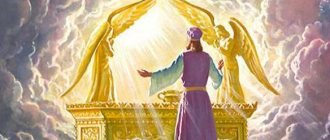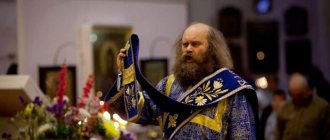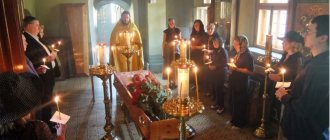Great Doxology
Glory to God in the highest, and on earth peace, good will
.
We praise Thee, we bless Thee, we bow to Thee, we glorify Thee, we thank Thee, O great one, for the sake of Thy glory. Lord Heavenly King, God the Father Almighty, Lord the Only Begotten Son, Jesus X Christ, and Holy Soul. Lord God, Lamb of God, Son of the Father, take away the
sin of the world, have mercy on us;
take away the sins of the world, accept our prayer; Thou art seated at the right hand of the Father, have mercy on us. For You are the only Holy One, You are the only Lord, Jesus Christ, to the glory of God the Father, Amen. Every day I will bless You and praise Your name forever and ever. Grant, Lord, that on this day we may be preserved without sin. Blessed are You, O Lord God of our Father, and praised and glorified is Your name forever. Amen. May Thy mercy be upon us, O Lord, as we trust in Thee. Blessed are You, Lord, teach me by Your justification. Blessed are you, Master, enlighten me with your justification (three times). Lord, you have been a refuge for us throughout generation and generation. Az said: Lord, have mercy on me, heal my soul, for I have sinned against You. Lord, I have come to You, teach me to do Your will, for You are my God; For with You is the source of life, in Your light we will see light. Show 2
Thy mercy to those who lead Thee. Holy God, Holy Mighty, Holy Immortal, have mercy on us (thrice). Glory to the Father and the Son and the Holy Spirit, now and ever and unto ages of ages. ́v. Amen. Holy God, Holy Mighty, Holy Immortal, have mercy on us.
Translation: Glory to God in the highest, and on earth peace, good will among men. We praise You, we bless You, we worship You, we praise You, we thank You for Your great glory. Lord, Heavenly King, God the Father Almighty, Lord, Only Begotten Son Jesus Christ, and the Holy Spirit! Lord God, Lamb of God, Son of the Father, who takes away the sin of the world, have mercy on us. He who takes away the sins of the world, accept our prayer, He who sits at the right hand of the Father, have mercy on us. For You alone are Holy, You alone are Lord, Jesus Christ, to the glory of God the Father. Amen. I will bless You every day and praise Your name forever and ever. Grant, Lord, that on this day we may be preserved without sin. Blessed are You, O Lord, God of our fathers, and praised and glorified is Your name forever. Amen. May Your mercy, O Lord, be upon us, as we trust in You. Blessed are You, O Lord, teach me Your commandments. Lord, You have become a refuge for us from generation to generation. I said: Lord, have mercy on me, heal my soul, for I have sinned before You. Lord, I have resorted to You, teach me to do Your will, for You are my God. For with You is the source of life, in Your light we will see light. Extend Your mercy to those who know You. Holy God, Holy Mighty, Holy Immortal, have mercy on us. Glory to the Father, and the Son, and the Holy Spirit, now, and always, and unto ages of ages. Amen. Holy God, Holy Mighty, Holy Immortal, have mercy on us.
* * *
At weekday (non-doxology) and Lenten holiday matins, as well as at Compline, the Great Doxology is replaced by the reading of the daily doxology.
Dictionary options
Dictionaries, as a rule, present two shades of interpretation of the linguistic object being studied.
- The first of them says that its essence lies in the glorification of some object, including a person.
- The second is marked “colloquial” and speaks of excessive praise of someone or something.
You may be interested in: Gazyr is... Meaning, history, application
To better understand that this is “doxology,” several examples of sentences with this lexical unit should be given.
Daily Doxology
Glory to God in the highest, and on earth peace, good will to men. We praise Thee, we bless Thee, we bow to Thee, we glorify Thee, we thank Thee great for the sake of Thy glory. Lord, Heavenly King, God, Father Almighty, Lord Only Begotten Son, Jesus Christ, and Holy Soul. Lord God, Lamb of God, Son of the Father, take away the sin of the world, have mercy on us. Take away the sins of the world, accept our prayer. Sit at the right hand of the Father, have mercy on us. For You are the only Holy One; You are one Lord, Jesus Christ, to the glory of God the Father, amen. Every day I will bless You and praise Your name forever and ever. Lord, You have been our refuge throughout generation and generation. Az reh: Lord, have mercy on me, heal my soul, for I have sinned against You. Lord, I have come to You, teach me to do Your will, for You are my God, for You are the source of life, in Your light we will see light. Show Thy mercy to those who lead Thee.
Translation: Glory to God in the highest, and on earth peace, good will among men. We praise You, we bless You, we worship You, we praise You, we thank You for Your great glory. Lord, Heavenly King, God, Father Almighty, Lord, Only Begotten Son Jesus Christ, and the Holy Spirit! Lord God, Lamb of God, Son of the Father, who takes away the sin of the world, have mercy on us. He who takes away the sins of the world, accept our prayer, He who sits at the right hand of the Father, have mercy on us. For You alone are Holy, You alone are Lord, Jesus Christ, to the glory of God the Father. Amen. Every night I will bless You and praise Your name forever and ever. Lord, You have become a refuge for us from generation to generation. I said: Lord, have mercy on me, heal my soul, for I have sinned before You. Lord, I have resorted to You, teach me to do Your will, for You are my God. For with You is the source of life, in Your light we will see light. Extend Your mercy to those who know You.
1
Take up - lifting. A twofold understanding of the fragment with this word is possible: “We proclaim peace on earth in those people whom God has loved (people of good will)!” “Thanks to the coming of Christ, the good will of God is poured out on all people.”
2
Try it - stretch it.
For the first case
As can be seen from the above formulation, the first version of meaning is more concerned with praising a truly worthy subject. This can be seen from the following examples:
- When people met the heroine, huge bouquets of flowers flew at her feet, and praises to the space explorers were constantly heard.
- The acts of the apostolic men are worthy of eternal praise.
- A description of the holiday or a reminder of the merits of a particular saint is at the beginning of the troparion. Whereas at the end there is a doxology or a request to the saints for prayer.
- Previously, it was difficult to imagine that angelic praise could be heard underground.
- Between other types of compositions, he also managed to compose elegant doxologies.
Origin
A short doxology, according to M. N. Skaballanovich, could arise from the final doxologies of liturgical prayers.[4] Traces of such praises are already found in the books of the New Testament (the Apostolic Epistles, the Apocalypse). The first example of a doxology listing all the persons of the Holy Trinity is contained in the dying prayer of the Hieromartyr Polycarp (died in 156).[5] There are similar doxologies in the acts of martyrdom of other saints of the 2nd century (for example, Ignatius the God-Bearer and others).
The Arians, to express their ideas, gave the doxology the following form: “ Glory to the Father through the Son in the Holy Spirit
"
This forced the Christian Church (probably at the First Ecumenical Council [4]) to finally consolidate the formula of doxology as “ Glory to the Father and the Son and the Holy Spirit
,” that is, in the form that most expresses the consubstantial Holy Trinity.
Notes
- Explanation of church and home prayers (undefined)
. Orthodoxy.Ru. Access date: February 10, 2016. - Catholic Encyclopedia, Doxology
- Dominica prima adventus domini // Missale Mixtum secundum regulam beati Isidori dictum mozarabes: Praefatione, notis et appendice ab A. Lesleo SJ sacerdote ornatum. Pars prima et pars secunda / A. Lesley, ed.. - Roma, 1755. - P. XCVI, 640.
- ↑ 12
Skaballanovich M. N. Explanatory Typikon Archived copy of April 18, 2010 on the Wayback Machine - Martyrdom of St. Polycarp, Bishop of Smyrna
- Six Psalms (undefined)
. "Novgorod.ru". Access date: February 10, 2016. - Small Doxology (undefined)
. iKliros. Access date: February 10, 2016.
For the second option
You may be interested in: Sacrifice is... Definition, types, personality traits
Judging by the examples below, the second shade of meaning rather emphasizes undeservedness, praise, and its excessiveness:
- From the very first seconds of communication, this man rained down such a stream of praise on his interlocutor that it was very difficult for the latter to remain critical without succumbing to it.
- Despite the fact that under Khrushchev the cult of personality was mercilessly condemned, the praise of the party bosses did not go away.
- When Andrei discussed his affairs with this smart woman, he felt relief and a huge surge of strength. She possessed, one might say, a man's mind; she managed to cheer up her counterpart without any praise.
- Anatoly himself did not expect from himself that he had such abilities for flattery, laudatory speeches and praise.
- You need to express criticism to your face, and not get carried away with idle praise; this can gradually become normal again and turn into a cult of personality. Moreover, history clearly confirms this.
To understand that this is a “doxology”, it would be useful to familiarize yourself with words that are close in meaning to what is being studied.
About angelic praise
Saint John Chrysostom calls the Nativity of Christ “the beginning of all holidays.”
“Whoever calls this holiday the mother of all holidays will not sin... In this holiday, the Epiphany, the Holy Easter, the Ascension of the Lord and Pentecost have their beginning and foundation. If Christ had not been born according to the flesh, he would not have been baptized, and this is the feast of the Epiphany; and would not have suffered, and this is Easter; and would not have sent the Holy Spirit, and this is Pentecost. So, from the feast of the Nativity of Christ our holidays began, like various streams from a source .
Modern church scholars believe that the Nativity of Christ is one of the oldest Christian holidays, along with the Annunciation and Easter. It is celebrated exactly 9 months after the Annunciation, on December 25 according to the “old style”. Initially, it was connected with the holiday of Epiphany, which appeared in the 3rd century, and this common holiday was called the Festival of Lights. In the ancient Roman calendar, dating back to the year 354, under December 25 (or the 8th calendar of January) it is written: “Birthday of Christ in Bethlehem.”
Experiencing the event of the Nativity of Christ in the church at a festive service, the angelic doxology “Glory to God in the highest, and on earth peace, good will toward men” is always perceived in a special way (Luke 2:14).
Based on the research of Konstantin Efimovich Skurat, Honored Professor of the Moscow Theological Academy, we will try to delve into the theological meaning of these amazing words.
Glory to God in the highest, and on earth peace, good will towards men...
So the Angels sang on that saving night when God came to earth in the flesh.
This song both delighted and surprised the shepherds. She announced the whole universe - and she raised some people to triumph, others moved to reflection.
Almost twenty (more than twenty) centuries separate us from that great night. Since that time, much has changed in the life of mankind: great empires, considered eternal and indestructible, have become a thing of the past, cultures have changed, social conditions of life have become new, the appearance of the earth has become unrecognizable. And only one thing has remained unchanged - the testimony of the Angels turning our gaze to the city of Bethlehem.
The Heavenly Warriors rejoice that with the incarnation of the Son of God, God's peace, mercy and good will will reign on earth. It is not the God of vengeance who descends to earth, but the God of mercy, not a judge, but a father, who descends not to punish for sin, but to resolve sin and have mercy on the sinner. “Build everything with the depth of wisdom, loving humanity, and give what is useful to everyone,”
the all-wise and all-good God Himself comes to man to open him the path to eternal life, to give him the true true means of salvation. Faithful witnesses to this will be the faces of numerous apostles and missionaries, martyrs and confessors, saints and hermits.
According to the definition of the Hierarch of the Russian Orthodox Church of the last century (the year before) (Metropolitan Platon (Levshin)) , “The angels in their short song proclaimed three important dogmas”
.
First dogma
-
this is “glory to God”, the second is “peace on earth” and the third is “good will towards men”.
Firstly, today the holy angels give glory to God in the highest, magnify Him, glorify Him for His endless love for people, giving His only begotten Son, “so that whoever believes in Him should not perish but have eternal life” (John 3:15 ). In their doxology they testify to the great sufferings that our Lord Jesus Christ Himself will suffer for us, so that we do not suffer forever, but receive endless eternal happiness. The law of truth demanded that the criminal be punished. And if only the Truth of God acted, then we would perish spiritually. No one, not even the greatest righteous people, could take upon themselves the sins of all mankind. This was done, and done voluntarily, out of His boundless love, by the Son of God the Savior.
About angelic praise
Secondly, the angels also sang: “... and on earth there is peace.”
The concept of peace is diverse.
There is an external world. This is peace between parents and children, husband and wife, between neighbors and entire countries - in short: any harmony between people, brotherhood, peaceful cohabitation. “Peace I leave with you, My peace I give to you,”
the Lord said to His disciples on the eve of suffering (John 14:27).
There is another world, also abandoned by the Savior (John 20:19). This is inner peace, peace with God and with your conscience, cleansed of all sinful filth. Expanding this concept of the world, Metropolitan Platon of Moscow says that on Christmas night the Angels sang as if like this: “Listen, all the earth! Wonmi, all under heaven! The entire human race! We bring peace to you all. You were enemies of God: with your countless crimes... iniquities... vices... But now... the barrier separating you from God has collapsed; Now the heavens are open, and the flaming weapon, guarding the doors of heaven, runs far; ...now God is reconciled with you. Look at His face: it already shines with fatherly love for you; He Himself goes (in the text: “runs” - K.S.) to meet you and raises his arms to embrace you... is preparing a glorious feast, and since he wanted to commemorate how much he loves you, he did not invent a better food for you than to treat you to give you even His Body, to feed you even with His Blood. This is not the state of peace, an undeserved world, a wonderful world, a priceless world, when so much of the incomprehensible majesty of God condescends to man, to dust, dirt and insignificance? Seeing this,” say the Angels, “we ... could not resist singing peace on earth and with this singing, resounding heaven and earth, raising up the entire human race.”
The world of Christ is where Christ the Lord Himself lives, where His holy commandments operate.
There is no peace in the soul, family, society - this means that it is not Christ who rules, but sin, which means they live not according to the spirit of Christ, but according to the attraction of the passions. The world of Christ must be perceived and assimilated both by faith in the omnipotent help of God, combined with prayer, and by active faith, combined with love, labor, and feat. This is how the ancient Church perceived the world proclaimed by the Angels, and this is how she understands it in our time.
Thirdly, “There is good will among men,” - with these words the angelic song ends.
The inhabitants of heaven glorify the Lord because, by His coming in the flesh, He shows the highest favor towards people: He will instill good will among them, revive them religiously, and breathe into them selfless brotherly love. “ Greater love has no one,
” He will say to His disciples, “ than this, that someone lay down his life for his friends” (John 15:13).
Christ the Savior will proclaim to people the purest and most sublime laws of morality. Along with these laws, He also gives the means and strength to fulfill them (I Peter 1:3), with the help of which everyone who believes in Him can be cleansed of sins and reborn, overcome every passion and accomplish every good. And when the good will of God spreads among people and is established, when people’s hearts are directed to deeds of love, when people understand that the true wealth and value of their lives lies in the constant doing of good, then they will enter the world of genuine, real happiness, which will become the threshold of eternal happiness and eternal life.
Roman Barannikov
from the Moscow courtyard.











